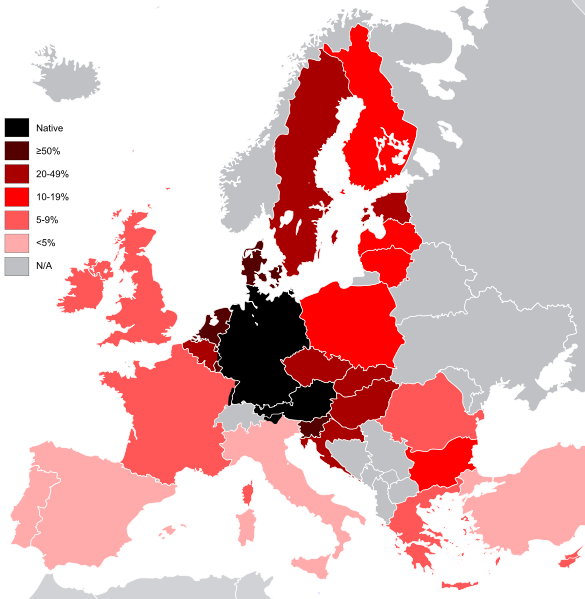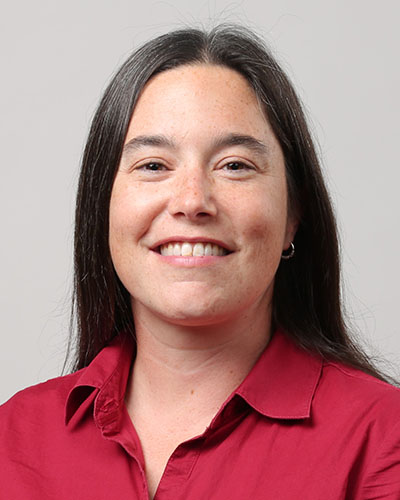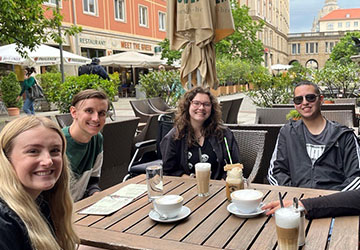Why study German?
- With 103 million native speakers, German is the most widely spoken language in Europe.
- Germany is Europe’s largest economy, is the 4th largest economy in the world, and is an economic and political powerhouse on the world stage.
- German is considered the 2nd most important language for conducting business.
- Speaking German has been shown to boost your salary the most of any foreign language, and offers the highest median U.S. salary for employment that requires a foreign language skill.
- German is one of the three official procedural languages of the European Union.
- Germany is the world’s 3rd largest contributor to research and development.
- Germany offers more financial support to foreign students than any other country in the world.
- Additionally, higher education in Germany is free! For everyone! So learn German, and move abroad after your B.A.!
- Speaking German opens doors for students in many majors, especially STEM fields, since Germany is known for its technological and scientific innovations and research centers (the Max Planck Institutes and the Fraunhofer Institutes, among others).
- Germany’s capital, Berlin, is the center of the modern art world today, with hipsters and start-ups abounding. A bit further south and east, Dresden is considered the Silicon Valley of Germany, with a thriving semiconductor industry not far from the historic Old Town (Altstadt) and eclectic New Town (Neustadt).
- Germany is leading the way as one of the most progressive, open, and tolerant countries in Europe.
- Germany offers one of the highest quality-of-life indexes in the entire world.
- Germany has some of the most breathtaking scenery and castles of Europe.
But most of all: learning German is fun! Ask any current German student about their experience. And when college life can feel overwhelming, the German department provides a home away from home. We are the masters of Gemütlichkeit, after all!
Where is German spoken?

Is German difficult?
Jein. Learning any foreign language requires time and effort, but German is the language taught at UTSA that is most closely related to English. In fact, you already know many German words like Musik, Autobahn, Angst, Restaurant, and Kindergarten.
Additionally, classes are structured to be immersive in nature and have you speaking German from your first day onward, which makes for a very rewarding class experience.
The German faculty at UTSA have an extensive background and training in Second Language Acquisition, ensuring that your learning experience will be design for maximum success.
Introductory classes at UTSA require no prior knowledge of German. If you’ve had some German before, contact Dr. Devon Donohue-Bergeler for placement questions so that you can find the best fit for your skill level.
And if you would like a chance outside of class to practice your German and meet up with other cool people, the department hosts a weekly meeting at the Stammtisch and German Club.
How does German fit in with my other coursework?
UTSA offers a five-semester German language sequence as well as many courses on German literature and culture taught in translation and therefore open to anyone! Courses cover topics such as Medieval to Contemporary German literature, German Fairy Tales, the German short story, German Cinema, and many interdisciplinary courses that focus on specific ideas, themes, or cities.
Examples of recent course offerings:
- Movies Go to War
- Love Conquers All?
- Migration in Post-War Germany
- Dresden: Florence on the Elbe
- German Film
- Depending on what credit you need, you can sign up for a GER or CSH course in order to earn Core credit for the Language, Philosophy, Culture component or to earn credit towards your degree in Modern Languages.
The German curriculum promotes language acquisition, the learning of intercultural competencies, as well as focusing on transferrable skills such as close reading, writing, and critical thinking skills. Together, these learned skills will not only help you master your coursework in other classes, but makes a German minor a great addition to any major, whether your future interests lie in business, a medical field, a STEM field, history, English, or any other field.
For more information, contact Dr. Devon Donohue-Bergeler.
What are the requirements for a minor in German?
German minors complete coursework in Intermediate and Advanced German Language (German 2013, 2023, and 3023) and three additional German-related courses, two of which must be taken at the upper-division level. Courses include CSH 1213 (Topic in World Cultures), MES 1213 (Cinema), and GER 2333, 4003, 3413, 4213 (See below for descriptions – topics will vary). For more information, contact Dr. Devon Donohue-Bergeler.
Subscribe to the UTSA German list-serv for regular updates

Contact
Modern Languages and Literatures
German Courses Offered
(3-2) 4 hours credit.
Fundamentals of German offering the opportunity to develop listening, reading, speaking, and writing skills. Introduction to German culture.
Fundamentals of German offering the opportunity to further develop abilities in listening, reading, speaking, and writing skills. Further exposure to German culture.
3 hours credit. Prerequisite: GER 1024, the equivalent, an appropriate placement test score, or consent of instructor.
Continued opportunity to develop listening, reading, speaking, and writing skills. Continued exposure to German culture.
Continued opportunity to develop listening, reading, speaking, and writing skills. Continued exposure to German culture.
Major works of German literature across time, genres, and movements. (Formerly GER 3333. Credit cannot be earned for both GER 2333 and GER 3333.)
Development of oral and written language skills using contemporary readings, media, and oral discourse. Emphasis on increasing fluency through vocabulary expansion activities and selective grammar review. May be repeated for credit when topics vary.
Selected works from the medieval period to the 21st century are studied as examples of central movements in German culture and literary history. The course presents the shape of German civilization, emphasizing the major periods, styles, movements, and generations. May be repeated for credit when topics vary.
Focuses on selected topics of cultural history, such as Vienna 1890–1914, Expressionism, contemporary cultural/political developments, or on a linguistic topic. May be repeated for credit when topics vary.
Supervised experience in a setting that provides the opportunity to integrate theory and practice in language usage. May be repeated once for credit.
An organized course offering the opportunity for specialized study not normally or not often available as part of the regular course offerings. Special Studies may be repeated for credit when the topics vary, but not more than 6 semester credit hours, regardless of discipline, will apply to a bachelor’s degree.
Honors Research 3 hours credit. Prerequisite: Consent of the undergraduate advisor.
Supervised research and preparation of an honors thesis. May be repeated once for credit, with approval.
What about study abroad?
UTSA offers a faculty-led program during the summer to Dresden. During this summer study abroad experience in Germany’s most vibrant, artsy city, students spend the mornings learning about history, politics, art, architecture, and literature, and then during the afternoons conduct research on a self-designed research project. This research project can be tailored to any major or area of interest, thereby allowing the study abroad to not only be a cultural experience but also work towards the student’s overall degree plan. There is no language requirement for the study abroad! For more information, visit the Dresden Study Abroad , or contact Dr. Devon Donohue-Bergeler with any additional questions.


